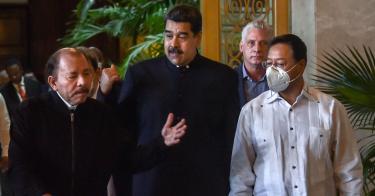The prevailing narrative in Washington is that democracy is in decline worldwide. Authoritarianism is on the rise. According to the Democracy Index, produced by the Economist Intelligence Unit, more than one third of the world lives under some form of authoritarian rule and that number is growing.
Among Latin America’s increasingly left-wing regimes, the trend is even more troubling.
According to a recent poll from Latinobarometer, a reputable Chilean polling firm, authoritarianism’s allure in the region is strongest among young people. The poll suggests that “younger Latin Americans, with no memory of the region’s murderous military dictatorships of the 1970s, are the least likely to agree that ‘democracy is preferable to any other form of government.’”
In other words, the democratic backslide in Latin America isn’t going to disappear anytime soon.
But to learn from our southern neighbors’ experience, U.S. policymakers need a better sense of Latin America’s history with democracy.
>>> The Marxist Influence of the São Paulo Forum in Latin America
Although most Latin American countries achieved independence from Spain in the decades following the American Revolution, many still had military dictatorships well into the mid- to late-twentieth century. Indeed, democracy did not flourish in Latin America until the 1990’s—and only then for a brief period, before it was hit with an autocratic hammer by the name of Hugo Chávez and his socialist Bolivarian revolution.
At the turn of the twenty-first century, Chávez, along with the Castro brothers in Cuba, sparked a renewed interest in authoritarianism through the Bolivarian Alliance of the Americas (ALBA), a political power project. ALBA eventually captured Nicaragua, Bolivia, Ecuador, and several Caribbean satellite states.
It’s taboo to talk about ALBA today, since the bloc has lost legitimacy. But the alliance served its purpose in resurrecting the image of the Latin American caudillo, which harkens back to Venezuela’s Simon Bolivar, Argentina’s Juan Manuel de Rosas, and Mexico’s Antonio Lopez de Santa Anna liberating vast swaths of the Spanish American hinterlands on horseback.
It would be unfair to say that today’s leftist neo-caudillos—such as Bolivia’s Evo Morales and Ecuador’s Rafael Correa—are anything like their colonial-era forebears. Whereas the former fought for liberation from colonial rule, the latter have subjugated their country’s sovereignty to external authoritarian control from Russia, China, and Iran. Indeed, even as they complain about colonialism, Venezuela’s Nicolás Maduro and Nicaragua’s Daniel Ortega have installed twenty-first-century dictatorships (or “democraduras,” as they are colloquially called in Spanish) and sold out their people to foreign governments.
And they’re not the only ones. Indeed, the current tide of authoritarianism in the region may not yet have reached its highpoint.
Ecuador, for example, which had seemingly broken away from the ALBA bloc in 2017, finds itself back under Bolivarian threat today. Ever since narco-induced political instability prevented center-right President Guillermo Lasso from finishing his four-year term, the country has been in political limbo.
Ecuador is currently preparing for a snap presidential election on August 20, and the leading candidate, Luisa Gonzalez, has already stated that, if she wins, former president Correa will be her principal advisor. Gonzalez was previously a tourism minister for Correa, who currently faces an eight-year prison sentence over corruption tied to his tenure as part of the socialist Bolivarian alliance.
In a recent interview, Correa said that if his allies win Ecuador’s election “we can achieve what [Nayib] Bukele is trying to do.” Nayib Bukele, of course, is the popular young president of El Salvador, and it’s nothing new for him to be cited favorably by foreign dictators. Bukele is no friend to democratic institutions, but by blending social media savvy and rule with an iron fist, he has managed to gain a massive following in the region and worldwide.
His effort to clamp down on the gangs that once ran large swaths of his country, for example, have been effective and won praise from people all over the political spectrum, but it has also advanced the appeal to authoritarian rule.
>>> Losing Guatemala as a Critical American Ally
And that brings us to what this most recent wave of authoritarianism can teach American policymakers: It’s not enough to talk about democracy; you must deliver results. As Bukele’s example proves, people in desperate circumstances are more willing to ignore constitutional constraints and support a strong man who looks out for them, even if—as in the case of Morales, Correa, Maduro, Ortega, and others—he makes their lives worse in the long run.
With poverty on the rise, and insecurity increasing at a rapid rate, more people than ever across Latin America—and increasingly, in the United States too—are finding themselves in precisely these challenging circumstances. While some are voting with their feet, fleeing in massive numbers to the U.S. southern border, those that remain in Latin America are often left wondering if democracy ever worked for them in the first place.
Aided by Russian disinformation, Iranian intelligence, and Chinese corruption, Latin America’s new authoritarians are today capitalizing on this sentiment. To avoid the same fate, U.S. policymakers and democracy advocates must learn from the region’s example.
Crucially, they must remember that it’s not enough simply to promote democracy. To defend democracy, you must define it, explaining the underpinnings of individual liberty and nation-state sovereignty that made democracy function as an effective form of governance.
More importantly, you must get real results for the people, rather than ignoring their concerns. Otherwise, they are all too likely to forget what made representative democracy worth having.
This piece originally appeared in The Hill on 8/16/2023



